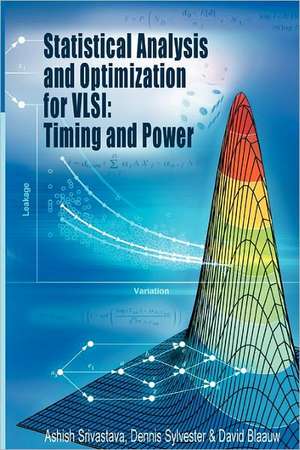Statistical Analysis and Optimization for VLSI: Timing and Power: Integrated Circuits and Systems
Autor Ashish Srivastava, Dennis Sylvester, David Blaauwen Limba Engleză Paperback – 8 dec 2010
| Toate formatele și edițiile | Preț | Express |
|---|---|---|
| Paperback (1) | 944.36 lei 43-57 zile | |
| Springer Us – 8 dec 2010 | 944.36 lei 43-57 zile | |
| Hardback (1) | 951.59 lei 43-57 zile | |
| Springer Us – 21 iun 2005 | 951.59 lei 43-57 zile |
Din seria Integrated Circuits and Systems
- 15%
 Preț: 658.22 lei
Preț: 658.22 lei - 18%
 Preț: 1388.68 lei
Preț: 1388.68 lei - 15%
 Preț: 641.71 lei
Preț: 641.71 lei - 18%
 Preț: 1213.46 lei
Preț: 1213.46 lei - 18%
 Preț: 954.45 lei
Preț: 954.45 lei - 15%
 Preț: 650.86 lei
Preț: 650.86 lei - 20%
 Preț: 988.16 lei
Preț: 988.16 lei - 18%
 Preț: 952.09 lei
Preț: 952.09 lei - 18%
 Preț: 950.52 lei
Preț: 950.52 lei - 15%
 Preț: 696.50 lei
Preț: 696.50 lei - 18%
 Preț: 950.21 lei
Preț: 950.21 lei - 18%
 Preț: 953.82 lei
Preț: 953.82 lei - 24%
 Preț: 805.40 lei
Preț: 805.40 lei - 20%
 Preț: 997.38 lei
Preț: 997.38 lei - 15%
 Preț: 634.00 lei
Preț: 634.00 lei - 18%
 Preț: 949.23 lei
Preț: 949.23 lei - 20%
 Preț: 643.63 lei
Preț: 643.63 lei - 18%
 Preț: 1227.36 lei
Preț: 1227.36 lei - 24%
 Preț: 803.82 lei
Preț: 803.82 lei - 15%
 Preț: 649.87 lei
Preț: 649.87 lei - 18%
 Preț: 830.70 lei
Preț: 830.70 lei - 23%
 Preț: 864.82 lei
Preț: 864.82 lei - 15%
 Preț: 635.31 lei
Preț: 635.31 lei - 15%
 Preț: 695.19 lei
Preț: 695.19 lei - 18%
 Preț: 941.05 lei
Preț: 941.05 lei - 15%
 Preț: 641.38 lei
Preț: 641.38 lei - 18%
 Preț: 1001.32 lei
Preț: 1001.32 lei - 18%
 Preț: 885.63 lei
Preț: 885.63 lei - 18%
 Preț: 946.87 lei
Preț: 946.87 lei - 15%
 Preț: 634.18 lei
Preț: 634.18 lei - 18%
 Preț: 956.30 lei
Preț: 956.30 lei - 18%
 Preț: 944.67 lei
Preț: 944.67 lei - 18%
 Preț: 941.05 lei
Preț: 941.05 lei - 18%
 Preț: 953.20 lei
Preț: 953.20 lei - 18%
 Preț: 942.76 lei
Preț: 942.76 lei - 23%
 Preț: 570.64 lei
Preț: 570.64 lei - 18%
 Preț: 952.89 lei
Preț: 952.89 lei
Preț: 944.36 lei
Preț vechi: 1151.66 lei
-18% Nou
Puncte Express: 1417
Preț estimativ în valută:
180.73€ • 187.98$ • 149.20£
180.73€ • 187.98$ • 149.20£
Carte tipărită la comandă
Livrare economică 14-28 aprilie
Preluare comenzi: 021 569.72.76
Specificații
ISBN-13: 9781441938275
ISBN-10: 1441938273
Pagini: 280
Ilustrații: X, 280 p. 105 illus.
Dimensiuni: 155 x 235 x 15 mm
Greutate: 0.41 kg
Ediția:Softcover reprint of hardcover 1st ed. 2005
Editura: Springer Us
Colecția Springer
Seria Integrated Circuits and Systems
Locul publicării:New York, NY, United States
ISBN-10: 1441938273
Pagini: 280
Ilustrații: X, 280 p. 105 illus.
Dimensiuni: 155 x 235 x 15 mm
Greutate: 0.41 kg
Ediția:Softcover reprint of hardcover 1st ed. 2005
Editura: Springer Us
Colecția Springer
Seria Integrated Circuits and Systems
Locul publicării:New York, NY, United States
Public țintă
ResearchCuprins
Statistical Models and Techniques.- Statistical Timing Analysis.- Statistical Power Analysis.- Yield Analysis.- Statistical Optimization Techniques.
Notă biografică
Ashish Srivastava received the B.Tech. degree in electrical engineering from the Indian Institute of Technology, Kanpur in 2001 and the M.S. degree in electrical engineering from the University of Michigan, Ann Arbor in 2003. He is currently pursuing the Ph.D. degree at the University of Michigan, Ann Arbor. In summe r 2003 he was with the Technology CAD Division, Intel Corporation, Hillsboro, where he was a Graduate Intern and in summer 2004 he was with the Austin Research Lab, IBM, where he worked on leakage power optimization techniques . He is a recipient of the Intel PhD Fellowship, 2004. His research interests include optimization and statistical techniques for low-power VLSI design.
Dennis Sylvester received the B.S. degree in electrical engineering summa cum laude from the University of Michigan, Ann Arbor, in 1995. He received the M.S. and Ph.D. degrees in electrical engineering from University of California, Berkeley, in 1997 and 1999, respectively. He worked at Hewlett-Packard Laboratories in Palo Alto, CA, from 1996 to 1998. His dissertation research was recognized with the 2000 David J. Sakrison Memorial Prize as the most outstanding research in the UC-Berkeley EECS department. After working as a Senior R&D Engineer in the Advanced Technology Group of Synopsys, Mountain View, CA, he is now an Assistant Professor of Electrical Engineering at the University of Michigan, Ann Arbor. He has published numerous articles in his field of research, which includes the modeling, characterization, and analysis of on-chip interconnect, low-power circuit design and design automation techniques, and variability-aware circuit approaches. Dr. Sylvester received an NSF CAREER award, the 2000 Beatrice Winner Award at ISSCC, two outstanding research presentation awards from the Semiconductor Research Corporation, and a best student paper award at the 1997 International Semiconductor Device Research Symposium. He is the recipient of the 2003 ACM SIGDA Outstanding New Faculty Award and the 1938E Award for teaching and mentoring, which is the highest award given to a junior faculty in the Michigan College of Engineering. He has served on the technical program committee of numerous design automation and circuit design conferences and was general chair for the 2003 ACM/IEEE System-Level Interconnect Prediction (SLIP) Workshop. In addition, he helps to define the circuit and physical design roadmap as a member of the International Technology Roadmap for Semiconductors (ITRS) U.S. Design Technology Working Group. He is a member of IEEE, ACM, American Society of Engineering Education, and Eta Kappa Nu.
David Blaauw received his B.S. in Physics and Computer Science from Duke University in 1986, his M.S. in Computer Science from the University of Illinois, Urbana, in 1988 and his Ph.D. in Computer Science from the University of Illinois, Urbana, in 1991. He worked at the Engineering Accelerator Technology Division, IBM Corporation, Endicott, as a Development Staff Member, until August 1993. From 1993 till August 2001, he worked for Motorola, Inc. in Austin, TX, where he was the manager of t he High Performance Design Technology group. Since August 2001, he has been on the faculty at the University of Michigan as an Associate Professor. His work has focused on VLSI design and CAD with particular emphasis on circuit analysis and optimization problems for high performance and low power designs. He was the Technical Program Chair and General Chair for the International Symposium on Low Power Electronic and Design in 1999 and 2000, respectively, and was the Technical Program Co-Chair and member of the Executive Committee the ACM/IEEE Design Automation Conference in 2000 and 2001.
Dennis Sylvester received the B.S. degree in electrical engineering summa cum laude from the University of Michigan, Ann Arbor, in 1995. He received the M.S. and Ph.D. degrees in electrical engineering from University of California, Berkeley, in 1997 and 1999, respectively. He worked at Hewlett-Packard Laboratories in Palo Alto, CA, from 1996 to 1998. His dissertation research was recognized with the 2000 David J. Sakrison Memorial Prize as the most outstanding research in the UC-Berkeley EECS department. After working as a Senior R&D Engineer in the Advanced Technology Group of Synopsys, Mountain View, CA, he is now an Assistant Professor of Electrical Engineering at the University of Michigan, Ann Arbor. He has published numerous articles in his field of research, which includes the modeling, characterization, and analysis of on-chip interconnect, low-power circuit design and design automation techniques, and variability-aware circuit approaches. Dr. Sylvester received an NSF CAREER award, the 2000 Beatrice Winner Award at ISSCC, two outstanding research presentation awards from the Semiconductor Research Corporation, and a best student paper award at the 1997 International Semiconductor Device Research Symposium. He is the recipient of the 2003 ACM SIGDA Outstanding New Faculty Award and the 1938E Award for teaching and mentoring, which is the highest award given to a junior faculty in the Michigan College of Engineering. He has served on the technical program committee of numerous design automation and circuit design conferences and was general chair for the 2003 ACM/IEEE System-Level Interconnect Prediction (SLIP) Workshop. In addition, he helps to define the circuit and physical design roadmap as a member of the International Technology Roadmap for Semiconductors (ITRS) U.S. Design Technology Working Group. He is a member of IEEE, ACM, American Society of Engineering Education, and Eta Kappa Nu.
David Blaauw received his B.S. in Physics and Computer Science from Duke University in 1986, his M.S. in Computer Science from the University of Illinois, Urbana, in 1988 and his Ph.D. in Computer Science from the University of Illinois, Urbana, in 1991. He worked at the Engineering Accelerator Technology Division, IBM Corporation, Endicott, as a Development Staff Member, until August 1993. From 1993 till August 2001, he worked for Motorola, Inc. in Austin, TX, where he was the manager of t he High Performance Design Technology group. Since August 2001, he has been on the faculty at the University of Michigan as an Associate Professor. His work has focused on VLSI design and CAD with particular emphasis on circuit analysis and optimization problems for high performance and low power designs. He was the Technical Program Chair and General Chair for the International Symposium on Low Power Electronic and Design in 1999 and 2000, respectively, and was the Technical Program Co-Chair and member of the Executive Committee the ACM/IEEE Design Automation Conference in 2000 and 2001.
Textul de pe ultima copertă
Statistical Analysis and Optimization for VLSI: Timing and Power is the first book summarizing the state-of-the-art in the newly emerging field of statistical computer-aided design (CAD) tools. The very latest research in statistical timing and power analysis techniques is included, along with efforts to incorporate parametric yield as the key objective function during the design process. The emphasis is on algorithms, modeling approaches for process variability, and statistical techniques that are the cornerstone of the probabilistic CAD movement.
Statistical Analysis and Optimization for VLSI: Timing and Power will allow new researchers in this area to come up to speed quickly, as well as provide a handy reference for those already working in CAD tool development.
Statistical Analysis and Optimization for VLSI: Timing and Power will allow new researchers in this area to come up to speed quickly, as well as provide a handy reference for those already working in CAD tool development.
Caracteristici
First book focused on statistical computer-aided design, which is a very active area of work today in both industry and academia Provides rigorous mathematical treatment of this subject with over 500 detailed equations, and over 120 figures and tables Contains the very latest in statistical optimization techniques for power and timing, with discussion of the advantages and drawbacks of various approaches












